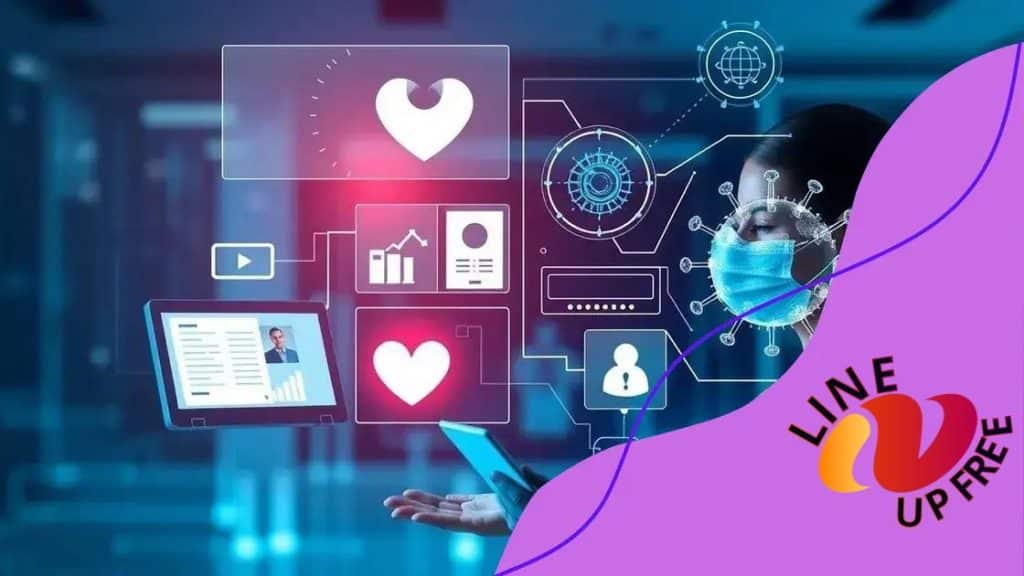The growing role of technology in managing public health

Anúncios
The growing role of technology in managing public health includes innovations like telehealth, AI, and personalized medicine, which enhance care accessibility, efficiency, and patient outcomes.
The growing role of technology in managing public health is not just a trend; it’s a necessity. Have you noticed how tech is reshaping healthcare? Join us as we discuss its profound impacts.
Anúncios
Understanding the impact of technology on health management
Understanding the impact of technology on health management involves recognizing how various innovations are transforming our healthcare systems. Technology plays a crucial role in enhancing patient care and improving health outcomes.
Key Technologies in Health Management
Several technologies are at the forefront of this transformation. These include electronic health records (EHRs), telemedicine, and mobile health applications. Each of these tools contributes uniquely to improving healthcare delivery.
- Electronic Health Records (EHRs): These digital records streamline patient information management, making it easier for healthcare providers to access and share data.
- Telemedicine: This technology enables remote consultations, which can save time and offer convenience for patients.
- Mobile Health Applications: These apps empower patients to monitor their health actively, promoting self-management and engagement.
The integration of these technologies fosters a more efficient and patient-centric approach to healthcare. For instance, EHRs not only reduce paperwork but also minimize errors in prescribing and diagnosis. Telemedicine has been particularly vital during crises, allowing care to continue despite physical barriers. Moreover, mobile health apps enhance patient education and adherence to treatment plans.
Anúncios
The Role of Data Analytics
Data analytics further revolutionizes health management by providing insights into patient populations and treatment outcomes. Through careful analysis, healthcare providers can identify trends and tailor interventions to improve public health. Additionally, this data-driven approach can lead to better resource allocation, ensuring that healthcare systems meet the needs of their communities.
Moreover, the use of artificial intelligence (AI) in predictive analytics allows for early intervention strategies, potentially saving lives and reducing healthcare costs. By leveraging technology in these ways, health management evolves to be more proactive rather than reactive.
Overall, embracing technology in health management presents numerous benefits. It enhances communication among providers, improves patient engagement, and increases access to care. As technology continues to advance, its role in managing health will only become more prominent, paving the way for innovative solutions.
Key technologies transforming public health
Key technologies transforming public health are crucial in improving health outcomes and managing disease prevention. Various innovations streamline processes and enhance patient care.
Telemedicine as a Game Changer
Telemedicine has revolutionized access to healthcare. It allows patients to connect with healthcare providers remotely, breaking geographical barriers. With just a smartphone or computer, individuals can consult doctors, receive diagnoses, and even have prescriptions filled, all from the comfort of their homes.
- Accessibility: Patients in rural areas can easily access specialists.
- Cost Efficiency: Reduces travel costs and time for both patients and providers.
- Convenience: Scheduling appointments becomes much easier and flexible.
Moreover, telemedicine proves essential in times of crisis, ensuring continued care without compromising safety.
Wearable Health Technology
Wearable devices, such as fitness trackers and smartwatches, provide valuable health data. These gadgets not only monitor physical activity but also track vital signs like heart rates and sleep patterns. By collecting this data, wearables empower individuals to take charge of their health and make informed decisions.
Additionally, this technology assists in chronic disease management, as continuous monitoring can alert users to potential health issues. This proactive approach can lead to earlier interventions and better management of conditions, such as diabetes or hypertension.
As wearables become more advanced, their integration with health management systems will enhance the quality of care provided. The ability to share real-time data with healthcare professionals opens avenues for personalized treatment plans and improved health outcomes.
Artificial Intelligence in Public Health
Artificial Intelligence (AI) plays a pivotal role in analyzing health data and predicting outbreaks. By leveraging vast amounts of data, AI algorithms can identify patterns and trends that humans might miss. This capability aids in forecasting disease spread and implementing preventive measures.
Moreover, AI assists in resource allocation, ensuring that healthcare systems respond efficiently to emerging health challenges. Through predictive modeling, public health officials can allocate vaccines and medical supplies to areas at higher risk.
The use of AI technologies significantly enhances the management of public health initiatives, helping to save lives and optimize resources.
Challenges in integrating technology into healthcare

Challenges in integrating technology into healthcare can significantly impact patient care and system efficiency. While innovations promise improvements, several hurdles must be addressed for successful implementation.
Resistance to Change
One of the major challenges is the resistance to change by healthcare professionals. Many providers may feel overwhelmed by new technologies or doubt their effectiveness. This resistance can hinder the adoption of beneficial tools that could enhance patient care.
- Training Needs: Staff often require extensive training to effectively use new technologies.
- Fear of Obsolescence: Some professionals fear that technology will replace their roles.
- Cultural Barriers: Established practices may clash with new methods.
Overcoming this resistance necessitates engaging healthcare providers in the decision-making process. By involving them early, organizations can create a smoother transition.
Data Security and Privacy Concerns
Another significant barrier involves data security and privacy concerns. As technology becomes more integrated, the risk of data breaches increases. Patient information must be protected to maintain trust in healthcare systems.
Healthcare organizations must invest in robust cybersecurity measures to safeguard sensitive data. This includes implementing encryption, secure access controls, and regular security audits to detect vulnerabilities.
Patients need to feel assured that their personal health information is secure. Failure to address these concerns could lead to a lack of engagement with technology-based health solutions.
High Costs and Budget Constraints
Furthermore, the high costs of technology implementation present another challenge. Obtaining new systems, training staff, and maintaining infrastructure can be financially demanding for healthcare facilities.
Many smaller practices may find it difficult to justify such expenditures. In response, finding affordable solutions or leveraging existing resources effectively is crucial. Partnerships with technology companies may provide the necessary support without overwhelming budgets.
Despite these challenges, the integration of technology in healthcare is essential for its evolution. Addressing these issues head-on will pave the way for a more connected and efficient healthcare system.
Real-world examples of tech in public health
Real-world examples of tech in public health illustrate the transformative power of innovation in healthcare systems. These examples highlight how technology enhances health monitoring, disease prevention, and patient engagement.
Remote Patient Monitoring
One notable example is remote patient monitoring, which utilizes devices to track patients’ health data from home. This technology allows healthcare providers to monitor conditions like chronic diseases without requiring frequent visits.
- Diabetes Management: Patients can use glucometers that transmit blood sugar levels to their healthcare teams, enabling timely adjustments to treatment plans.
- Heart Health: Wearable devices can alert doctors if a patient’s heart rate goes outside of the normal range.
- Post-Surgery Monitoring: Following surgery, patients can be monitored to detect complications early, improving recovery outcomes.
This approach not only enhances patient care but also reduces healthcare costs by minimizing in-person visits.
Telehealth Services
Another significant advancement is the rise of telehealth services, which gained traction during the COVID-19 pandemic. Telehealth allows patients to consult healthcare professionals via video calls or messaging, providing access to care regardless of location.
This system is particularly beneficial for mental health services, as it offers privacy and convenience for patients seeking therapy. Telehealth has also made it easier for rural populations to access specialists without lengthy travel.
Data Analytics for Epidemic Response
Data analytics plays a crucial role in managing public health crises. For example, during the Ebola outbreak, health authorities used data to track the spread of the disease and allocate resources effectively. By analyzing patterns and trends, they were able to implement timely interventions.
Similarly, with the ongoing COVID-19 pandemic, data analytics has been key in vaccine distribution and tracking infection rates. Health organizations use these insights to make informed decisions about public health policies.
These real-world examples demonstrate that technology is reshaping public health strategies. As these tools evolve, they will continue to improve patient outcomes and enhance the efficiency of healthcare systems.
The future of public health and technology
The future of public health and technology promises exciting advancements that will reshape how healthcare is delivered and managed. As technology evolves, its integration into public health will continue to enhance patient care and outcomes.
Personalized Medicine
One major trend is the shift toward personalized medicine. This approach uses genetic information to tailor medical treatment to individual patients. By analyzing a person’s genetic makeup, healthcare providers can recommend more effective treatments with fewer side effects.
- Genetic Testing: Enables identification of predispositions to certain health conditions.
- Targeted Therapies: Focus on specific characteristics of a disease.
- Better Outcomes: Increases the likelihood of successful treatment.
As personalized medicine expands, it will foster a more proactive approach to health, moving care from reactive to preventive.
Artificial Intelligence Advancements
Another significant development will be the enhanced use of artificial intelligence (AI). AI can analyze vast amounts of health data quickly, helping to predict disease outbreaks and manage medical resources effectively.
AI algorithms constantly learn and improve, making them invaluable tools in diagnostics, patient care, and operational efficiency. From predicting patient admissions to identifying high-risk populations, AI holds immense potential in transforming public health.
Telehealth Expansion
Telehealth services will continue to expand, providing more accessible healthcare to diverse populations. The convenience of virtual consultations ensures that patients can receive care without the barriers of distance or mobility.
With ongoing improvements in technology, telehealth can enable remote monitoring of patients with chronic conditions, improving management and outcomes. This approach not only saves time but also reduces healthcare costs for both providers and patients.
Ultimately, the future of public health and technology looks bright. As innovations emerge, they will empower both healthcare providers and patients, leading to more effective health management strategies and improved public health outcomes.
FAQ – Frequently Asked Questions about Technology in Public Health
How is technology changing public health?
Technology is enhancing public health through telehealth services, remote monitoring, and data analytics, improving patient care and accessibility.
What is personalized medicine?
Personalized medicine tailors healthcare treatments based on individual genetic information, leading to more effective therapies with fewer side effects.
What role does AI play in healthcare?
AI analyzes large datasets to predict disease outbreaks, optimize resource allocation, and assist in diagnostic processes, improving overall healthcare efficiency.
How does telehealth improve access to care?
Telehealth allows patients to connect with healthcare providers remotely, breaking down geographic barriers and providing convenient access to medical advice and treatment.





